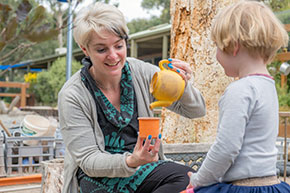Special needs, special play?
Examining the agency of children with impairments in play-based learning in a Special School
Amy Claughton - School of Education
Supervisors, Associate Professor Jenene Burke and Dr Genée Marks.
 Play is an inherent part of childhood, often cast as an innate behaviour of children. Over the years, play has been scrutinised by theorists, researchers and educators alike in their attempts to understand how children engage in play, its role in development and how to identify, define and measure play. For children with impairments, play is frequently subjected to surveillance and compared to that of children whose development is considered typical.
Play is an inherent part of childhood, often cast as an innate behaviour of children. Over the years, play has been scrutinised by theorists, researchers and educators alike in their attempts to understand how children engage in play, its role in development and how to identify, define and measure play. For children with impairments, play is frequently subjected to surveillance and compared to that of children whose development is considered typical.
This thesis interrogates the play-based learning experiences of five children who attended a special educational school in rural Victoria, Australia. It examines their experiences and how teacher actions and responses enabled and supported their engagement in play-based learning.
The theoretical framework for this study draws on critical ethnography underpinned by disability studies. Disability studies recognises the social model of disability, in which disability is a social construction. Using this model, impairment is distinct and separate from disability. Socially constructed barriers that confront children in their play are identified as being created by attitudes, structures and environments (Bishop et al., 1999). These barriers are overlaid by the psycho-emotional dimensions of disability (C. Thomas, 1999) in an effort to represent the experiences of children as shaped by the actions and responses of others. This thesis introduces a new analytic tool, the learning portal framework, which provides a platform through which teacher actions and responses are analysed to understand children’s access to play-based learning.
The findings of this study indicate that children with impairments play in complex and nuanced ways. They show purpose in their play, are able to self-initiate, and independently investigate play-based learning experiences. Adult actions and responses often enable children with impairments to engage in play by offering opportunities and pathways for exploration. Indirect adult facilitation in play supports children’s ability to act in play with individuality and determination.
Amy Claughton was supported by an Australian Government Research Training Program (RTP) Stipend and RTP Fee-Offset Scholarship through Federation University Australia.